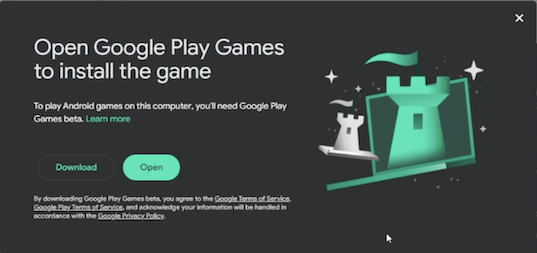Con Google Play Giochi su PC, gli sviluppatori possono eseguire campagne di acquisizione utenti in modo simile a quanto fanno oggi con i cellulari Android utilizzando la libreria Google Play Install Referrer e il collegamento alla scheda del Google Play Store.
Scenario di esempio:
Lo sviluppatore genera un URL di Google Play, che include informazioni sull'attribuzione di marketing e link alla pagina della scheda del gioco del Google Play Store, e lo utilizza in un annuncio sul web o in un gioco GPG su PC esistente. Potrebbe avere un aspetto simile al seguente:
https://play.google.com/store/apps/details?id=com.sample.package&referrer=utm_source%3Dsearch%26utm_medium%3Dcpc%26utm_campaign%3DsummerpromoIn questo esempio
utm_source%3Dsearch%26utm_medium%3Dcpc%26utm_campaign%3Dsummerpromocorrisponde alla stringa creata dallo sviluppatore per l'attribuzione di marketing e, al momento dell'installazione del gioco, viene trasmessa tramite il campo referrer al client di gioco.Quando un utente PC fa clic su un annuncio con questo link, viene reindirizzato alla pagina della scheda del gioco nell'interfaccia utente web di Google Play, che offre all'utente la possibilità di Installare su Windows.

Se fai clic su Installa su Windows, l'utente viene invitato ad aprire o scaricare il client Google Play Giochi su PC.

Se l'utente ha già installato il client, facendo clic su Apri viene avviata la pagina dei dettagli del gioco su Google Play Giochi su PC e viene avviato automaticamente il processo di installazione.
Se l'utente non ha installato Google Play Giochi su PC, facendo clic su Scarica viene avviato il download del programma di installazione della piattaforma e, dopo l'installazione e la configurazione di Google Play Giochi su PC, l'installazione del gioco viene avviata automaticamente.
Il flusso è lo stesso indipendentemente dal fatto che l'utente faccia clic sull'annuncio dal browser web o che si trovi all'interno di un altro gioco GPG su PC. Per quest'ultimo, il client Google Play Giochi su PC avvia un browser con la pagina di elenco del gioco nell'interfaccia utente web di Google Play Store per avviare il flusso di download.
Una volta installata e avviata l'app, lo sviluppatore può recuperare i dettagli del referrer all'interno del gioco utilizzando la libreria Google Play Install Referrer.

